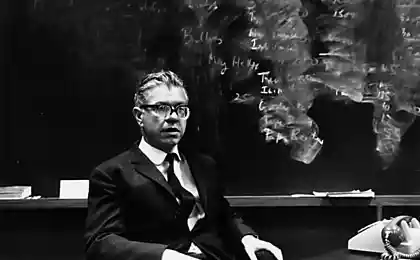490
The effect of Franklin: how to win the favor of important and busy people
Is it possible to make useful connections, if you have no experience and no one knows? Responsible psychologist Meg Jay.
Psychologist Meg Jay has written a book "Important. Why you should not put off life for later" — about the people aged 20-30 years who can not understand what to do with my life.
We publish a fragment from the book in which shows you how to attract the attention of experienced and influential people.

At the end of the eighteenth century Benjamin Franklin was involved in politics in Pennsylvania and tried to win the favor of one of his fellow legislators. Here is how he describes the story in his autobiography:
"I wanted... to secure his position, giving him any servile attentions; but after a while I used a different method.
Hearing that his library has a very rare and interesting book, I sent him a note that expressed his desire this book to read and asked to give me the courtesy of borrowing it for a few days. He sent it immediately, and I returned it about a week with the note which thanked for the service.
When we next met in the House, he spoke to me that I never did, and quite graciously.
In the future he would invariably find a willingness to provide services to me in all cases so that we soon became great friends and our friendship lasted until his death.
Here's another example of justice I have learned the ancient sayings, which reads: "He who has once done you a good turn, again more likely to help you than someone you are helped".
It seems to us that if people have for us the sympathy, they will provide us with services, since this is the case in urban communities.
However, the effect of Benjamin Franklin and the subsequent empirical research suggests that in the case of unfamiliar people, things are different. Such people begin to feel sympathy for us, only when they do us some favor.
After that they are ready to provide us other services. Franklin came to the conclusion that if he must have someone to himself, he should ask this person about the service. And so he did.
The effect of Benjamin Franklin shows that although the installation do affect behavior, it also can have an impact on the installation. If we provide a service to someone, we start to believe in what you feel sympathy for this man. This sympathy leads to the next service, etc.
Being a variation of the technique "foot in the door" (the strategy in which first need to ask a favour, and then on a larger), the effect of Benjamin Franklin suggests that one eventually gives rise to the other, and small services entail larger.
However, speaking about the effect of Benjamin Franklin, often omit the issue of great interest to many boys and girls of twenty years: why would a man, perhaps, older and more successful, will help them? How Benjamin Franklin managed to achieve the first service?
It's very simple. Good deeds to make nice. When a person is being generous, he had a feeling called "pleasure assistant".
In the course of numerous studies have established a direct link between altruism and happiness, health and longevity, but only under the condition that the assistance we provide to another person does not become a burden to him. Most people remember how in the beginning of the life path they have helped some of those who have already achieved some success.
In this respect, have benevolence towards young people after twenty is the reverse side.
Helping others is one of the essential elements of maturity, so twenty young men and women, turning to strangers for help, give them the opportunity to do a good deed, and to experience the fun of it, if what they ask is not beyond reasonable.
Let us discuss this point.

Sometimes twenty to thirty years trying to discuss with strangers their vague career aspirations based on the fact that these people tell them what to do. Such requests do not go beyond the possibilities of successful people, but unable to go beyond their schedules or roles.
Writing a detailed answer to an email about higher education, which someone has to, might require a lot of time. In addition, people with whom you maintain weak ties should not tell you, who better to become a social worker or performer of folk music.
One chief of staff told me the following: "it Often happens that people agree with me about the meeting to find out about vacancies in our company, and when you do, lean back in the chair, folding my hands and waiting for a reaction from me. And I have thought: “it was you who asked me about the meeting, ask the right questions! Don't ask me how long I have worked at, if only to keep the conversation going until I tell you what you want to do with my life"".
Let's look more closely analyze what is asked Benjamin Franklin. He was not sent to lawmakers messenger with a note which said: "Peanut soup at the diner?" (in the eighteenth century it would be the equivalent of the electronic message with the words "Coffee?" or "Chat?"). Franklin knew that a busy person such a proposal may seem too vague, so acted more wisely, develop the right strategy.
Franklin studied the information about the person, the location of which wanted to achieve, and defined its sphere of interest. He showed himself as a serious person who speaks with an important request. It piqued his interest. Proved its adequacy. And made a clear request: to allow him to use the book.
When you ask people with whom they maintain weak ties, give you recommendations, make proposals, meet with someone or to conduct a well-rounded informational interview, I recommend you to follow the same approach: awaken his interest. Demonstrate its relevance. Spend the necessary preparatory work in order to know exactly what you need or what you aspire to. And then politely ask. Some of those to whom you will ask, I will answer you with a refusal. However, many will agree to do it.
The fastest way to something new is one phone call, one email, one parcel of books, one service, one party in honor of the thirtieth anniversary.
I once found a cookie in such a prediction: "a Wise man makes his destiny".
Perhaps the best thing we can do for your own fate in twenty years, is to say "Yes" to their weak ties or give them a reason to say "Yes" to us.
Studies show that in adult life, a network of social contacts is narrowed, as career and family life have made people busier. That is why, even if we often change jobs, moving from place to place, living with different people and spend a lot of time at parties — it is the right time to establish useful contacts, not only with those who says that they have a bad job or that in the world there is good people, but to those who see everything a little differently.
Weak ties are the contacts with those people that will help you to improve your life right now (and will do it again and again in the coming years), if only you will take it upon myself to figure out what you really want.published
P. S. And remember, just changing your mind — together we change the world! ©
Source: ideanomics.ru/articles/2906
Psychologist Meg Jay has written a book "Important. Why you should not put off life for later" — about the people aged 20-30 years who can not understand what to do with my life.
We publish a fragment from the book in which shows you how to attract the attention of experienced and influential people.

At the end of the eighteenth century Benjamin Franklin was involved in politics in Pennsylvania and tried to win the favor of one of his fellow legislators. Here is how he describes the story in his autobiography:
"I wanted... to secure his position, giving him any servile attentions; but after a while I used a different method.
Hearing that his library has a very rare and interesting book, I sent him a note that expressed his desire this book to read and asked to give me the courtesy of borrowing it for a few days. He sent it immediately, and I returned it about a week with the note which thanked for the service.
When we next met in the House, he spoke to me that I never did, and quite graciously.
In the future he would invariably find a willingness to provide services to me in all cases so that we soon became great friends and our friendship lasted until his death.
Here's another example of justice I have learned the ancient sayings, which reads: "He who has once done you a good turn, again more likely to help you than someone you are helped".
It seems to us that if people have for us the sympathy, they will provide us with services, since this is the case in urban communities.
However, the effect of Benjamin Franklin and the subsequent empirical research suggests that in the case of unfamiliar people, things are different. Such people begin to feel sympathy for us, only when they do us some favor.
After that they are ready to provide us other services. Franklin came to the conclusion that if he must have someone to himself, he should ask this person about the service. And so he did.
The effect of Benjamin Franklin shows that although the installation do affect behavior, it also can have an impact on the installation. If we provide a service to someone, we start to believe in what you feel sympathy for this man. This sympathy leads to the next service, etc.
Being a variation of the technique "foot in the door" (the strategy in which first need to ask a favour, and then on a larger), the effect of Benjamin Franklin suggests that one eventually gives rise to the other, and small services entail larger.
However, speaking about the effect of Benjamin Franklin, often omit the issue of great interest to many boys and girls of twenty years: why would a man, perhaps, older and more successful, will help them? How Benjamin Franklin managed to achieve the first service?
It's very simple. Good deeds to make nice. When a person is being generous, he had a feeling called "pleasure assistant".
In the course of numerous studies have established a direct link between altruism and happiness, health and longevity, but only under the condition that the assistance we provide to another person does not become a burden to him. Most people remember how in the beginning of the life path they have helped some of those who have already achieved some success.
In this respect, have benevolence towards young people after twenty is the reverse side.
Helping others is one of the essential elements of maturity, so twenty young men and women, turning to strangers for help, give them the opportunity to do a good deed, and to experience the fun of it, if what they ask is not beyond reasonable.
Let us discuss this point.

Sometimes twenty to thirty years trying to discuss with strangers their vague career aspirations based on the fact that these people tell them what to do. Such requests do not go beyond the possibilities of successful people, but unable to go beyond their schedules or roles.
Writing a detailed answer to an email about higher education, which someone has to, might require a lot of time. In addition, people with whom you maintain weak ties should not tell you, who better to become a social worker or performer of folk music.
One chief of staff told me the following: "it Often happens that people agree with me about the meeting to find out about vacancies in our company, and when you do, lean back in the chair, folding my hands and waiting for a reaction from me. And I have thought: “it was you who asked me about the meeting, ask the right questions! Don't ask me how long I have worked at, if only to keep the conversation going until I tell you what you want to do with my life"".
Let's look more closely analyze what is asked Benjamin Franklin. He was not sent to lawmakers messenger with a note which said: "Peanut soup at the diner?" (in the eighteenth century it would be the equivalent of the electronic message with the words "Coffee?" or "Chat?"). Franklin knew that a busy person such a proposal may seem too vague, so acted more wisely, develop the right strategy.
Franklin studied the information about the person, the location of which wanted to achieve, and defined its sphere of interest. He showed himself as a serious person who speaks with an important request. It piqued his interest. Proved its adequacy. And made a clear request: to allow him to use the book.
When you ask people with whom they maintain weak ties, give you recommendations, make proposals, meet with someone or to conduct a well-rounded informational interview, I recommend you to follow the same approach: awaken his interest. Demonstrate its relevance. Spend the necessary preparatory work in order to know exactly what you need or what you aspire to. And then politely ask. Some of those to whom you will ask, I will answer you with a refusal. However, many will agree to do it.
The fastest way to something new is one phone call, one email, one parcel of books, one service, one party in honor of the thirtieth anniversary.
I once found a cookie in such a prediction: "a Wise man makes his destiny".
Perhaps the best thing we can do for your own fate in twenty years, is to say "Yes" to their weak ties or give them a reason to say "Yes" to us.
Studies show that in adult life, a network of social contacts is narrowed, as career and family life have made people busier. That is why, even if we often change jobs, moving from place to place, living with different people and spend a lot of time at parties — it is the right time to establish useful contacts, not only with those who says that they have a bad job or that in the world there is good people, but to those who see everything a little differently.
Weak ties are the contacts with those people that will help you to improve your life right now (and will do it again and again in the coming years), if only you will take it upon myself to figure out what you really want.published
P. S. And remember, just changing your mind — together we change the world! ©
Source: ideanomics.ru/articles/2906























